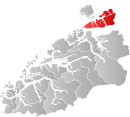Aure Municipality
| Aure kommune | |||
|---|---|---|---|
| Municipality | |||
 |
|||
|
|||
 Aure within Møre og Romsdal |
|||
| Coordinates: 63°16′7″N 8°36′28″E / 63.26861°N 8.60778°ECoordinates: 63°16′7″N 8°36′28″E / 63.26861°N 8.60778°E | |||
| Country | Norway | ||
| County | Møre og Romsdal | ||
| District | Nordmøre | ||
| Administrative centre | Aure | ||
| Government | |||
| • Mayor (2007) | Ingunn Oldervik Golmen (Sp) | ||
| Area | |||
| • Total | 643.94 km2 (248.63 sq mi) | ||
| • Land | 624.25 km2 (241.02 sq mi) | ||
| • Water | 19.69 km2 (7.60 sq mi) | ||
| Population (2010) | |||
| • Total | 3,570 | ||
| • Density | 5.7/km2 (15/sq mi) | ||
| • Change (10 years) | 33.7 % | ||
| Demonym(s) | Aurgjelding | ||
| Time zone | CET (UTC+1) | ||
| • Summer (DST) | CEST (UTC+2) | ||
| ISO 3166 code | NO-1576 | ||
| Official language form | Neutral | ||
| Website | www |
||
|
|
|||
Aure is a municipality in Møre og Romsdal county, Norway. It is part of the region of Nordmøre. The administrative centre is the village of Aure. Other villages in Aure include Gullstein, Stemshaug, Todalen, Tjeldbergodden, and Tømmervåg. Aure has one of the largest wooden churches in Norway, Aure Church.
The municipality was established on 1 January 1838 (see formannskapsdistrikt). On 1 January 1894, the southern district of Aure (population: 942) was separated to form the new municipality of Valsøyfjord. Then on 1 July 1914, the northeastern district of Aure (population: 851) was separated to form the new municipality of Stemshaug. On 1 January 1965, the municipality of Stemshaug (population: 877), the part of Valsøyfjord municipality on the island of Ertvågsøya (population: 141), and the part of Tustna municipality on Ertvågsøya (population: 85) were all merged into the municipality of Aure. On 1 January 1976, the district of Aure located south of the Vinjefjorden (population: 158) was merged into Halsa Municipality. On 1 January 2006, the municipality of Tustna was merged into Aure.
The municipality (originally the parish) is named after the old Aure farm (Old Norse: Aurar), since the first church (Aure Church) was built there. The name is the plural form of aurr which means "gravel".
...
Wikipedia


